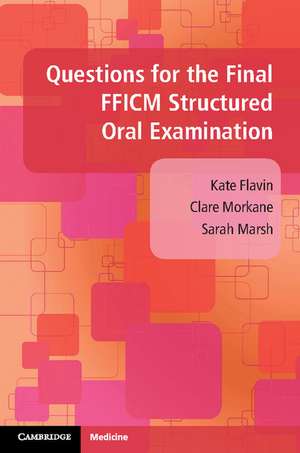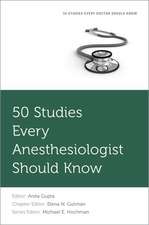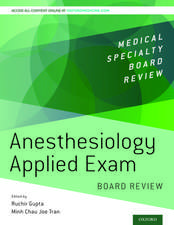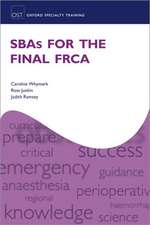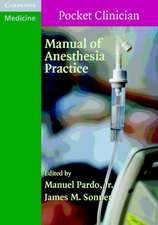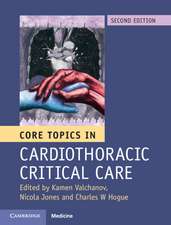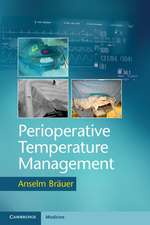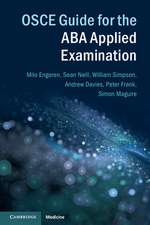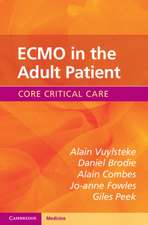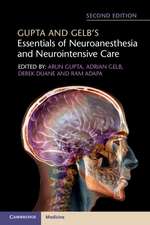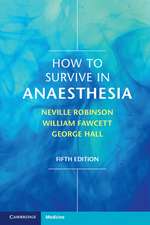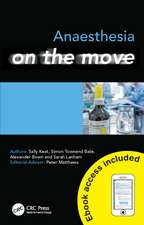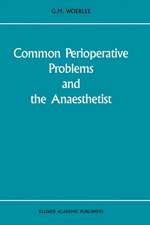Questions for the Final FFICM Structured Oral Examination
Autor Kate Flavin, Clare Morkane, Sarah Marshen Limba Engleză Paperback – 7 mar 2018
Preț: 447.58 lei
Preț vechi: 471.14 lei
-5% Nou
Puncte Express: 671
Preț estimativ în valută:
85.64€ • 89.66$ • 70.86£
85.64€ • 89.66$ • 70.86£
Carte tipărită la comandă
Livrare economică 07-21 aprilie
Preluare comenzi: 021 569.72.76
Specificații
ISBN-13: 9781108401425
ISBN-10: 1108401422
Pagini: 556
Ilustrații: 58 b/w illus.
Dimensiuni: 155 x 234 x 26 mm
Greutate: 0.93 kg
Editura: Cambridge University Press
Colecția Cambridge University Press
Locul publicării:Cambridge, United Kingdom
ISBN-10: 1108401422
Pagini: 556
Ilustrații: 58 b/w illus.
Dimensiuni: 155 x 234 x 26 mm
Greutate: 0.93 kg
Editura: Cambridge University Press
Colecția Cambridge University Press
Locul publicării:Cambridge, United Kingdom
Cuprins
1. Abdominal aortic aneurysm; 2. Abdominal compartment syndrome; 3. Acute ischaemic stroke; 4. Acute kidney injury and renal replacement therapy; 5. Acute liver failure and paracetamol overdose; 6. Acute respiratory distress syndrome; 7. Adrenal insufficiency in the ICU; 8. Amniotic fluid embolism; 9. Anaphylaxis; 10. Antibiotic therapy; 11. Antimicrobial resistance; 12. Aortic dissection; 13. Arrhythmias; 14. Asthma; 15. Bronchopleural fistulae; 16. Burns; 17. Calcium; 18. Cardiac output monitoring; 19. Cardiogenic shock; 20. Care of the heart-beating organ donor; 21. Chronic liver disease in the ICU; 22. Chronic obstructive pulmonary disease; 23. Colloids; 24. Critical incidents in the ICU; 25. Delirium; 26. Diabetic emergencies; 27. Diagnosing brainstem death; 28. Diarrhoea; 29. Disorders of consciousness; 30. Donation after circulatory death; 31. Drowning; 32. Encephalitis; 33. Fire in the ICU; 34. Fungal infection and antifungal therapy; 35. Guillian-Barré syndrome; 36. Haematological malignancy on the ICU; 37. Haemoglobinopathies, coagulopathies and thrombophilia on the ICU; 38. Haemolytic uraemic syndrome and thrombotic thrombocytopenic purpura; 39. High-risk surgical patient; 40. HIV in the ICU; 41. Hypertension; 42. Hyperthermia; 43. Hyponatraemia; 44. Hypothermia; 45. ICU-acquired weakness; 46. Infective endocarditis; 47. Inflammatory bowel disease and ICU; 48. Influenza; 49. Interstitial lung disease and critical care; 50. Intracerebral haemorrhage; 51. Magnesium; 52. Major incidents; 53. Malaria; 54. Mental capacity and deprivation of liberty; 55. Myasthenia gravis; 56. Necrotising fasciitis; 57. Non-invasive ventilation; 58. Nosocomial infection and ventilator-associated pneumonia; 59. Novel anticoagulants; 60. Nutrition in the ICU; 61. Percutaneous tracheostomy; 62. Pharmacokinetics in the critically ill patient; 63. Phosphate; 64. Plasmapheresis; 65. Pleural effusions; 66. Potassium; 67. Pre-eclampsia and HELLP; 68. Pseudo-obstruction and Ileus; 69. Puerperal sepsis; 70. Pulmonary haemorrhage and haemoptysis; 71. Pulmonary hypertension; 72. Rehabilitation following critical illness; 73. Rhabdomyolysis; 74. Right heart failure; 75. Scoring systems; 76. Sedation; 77. Sepsis; 78. Severe acute pancreatitis; 79. Spinal cord injury; 80. Subarachnoid haemorrhage; 81. Tetanus; 82. Thyroid emergencies; 83. Toxicology and overdose; 84. Transfusion; 85. Trauma; 86. Traumatic brain injury; 87. Tuberculosis; 88. Venous thromboembolism, heparin and heparin-induced thrombocytopenia; 89. Viral infection and antiviral therapy; 90. Weaning from mechanical ventilation; 91. Withdrawal of treatment and end-of-life care on the ICU.
Notă biografică
Descriere
An essential, up-to-date and evidence-based revision guide designed in the style of the Final FFICM structured oral examination.
